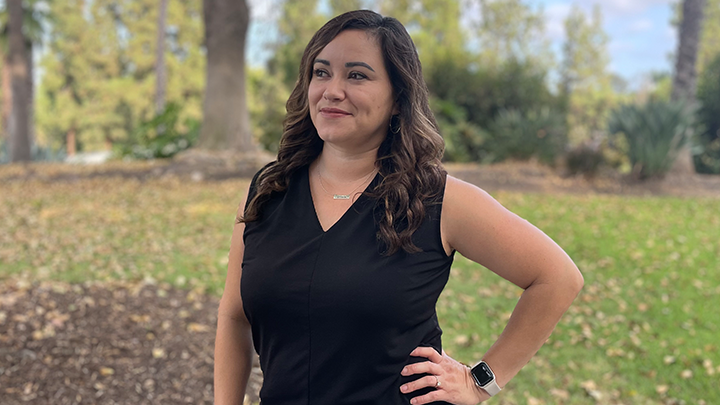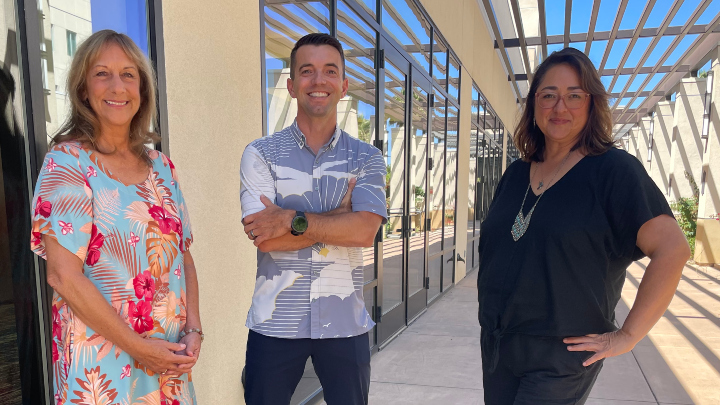New AAHHE chair-elect feels ‘sense of urgency’
SDSU associate professor Marissa Vasquez will lead the American Association of Hispanics in Higher Education from 2025-2026.

As a young Ed.D. student at San Diego State University, Marissa Vasquez received a piece of advice that proved transformative.
Her mentor Professor J. Luke Wood — now president of Sacramento State — encouraged her to apply for a graduate fellowship with the American Association of Hispanics in Higher Education (https://www.aahhe.org/). This national organization tackles issues and concerns affecting Latinx communities in academia.
“He was mentoring me to pursue a faculty route and he told me I needed to build community with other Latinx scholars in higher education,” Vasquez recalls. “That opened the door for me.”
Now associate professor of postsecondary educational leadership at SDSU, Vasquez garnered another title in August: chair-elect of AAHHE.
As part of a three-year commitment, Vasquez will serve as chair from 2025-26 and past chair from 2026-27. She was elected to the AAHHE board just last year, along with SDSU doctoral student Naomi Ramirez.
A proud community college transfer from San Diego’s South Bay, Vasquez is associate director of SDSU’s Community College Equity Assessment Lab. She and her team conduct research that aims to amplify the success of community college transfers and other underrepresented college students.
The SDSU News Team caught up with Vasquez to discuss AAHHE and how her new role connects to SDSU’s status as a Hispanic Serving Institution (HSI).
What made you want to take on this leadership role of AAHHE?
We were in a board meeting and the current chair was speaking about the position. I guess I had this feeling of responsibility. This organization has given a lot to me professionally and personally —the networks, the friendships that I've developed over the years. It contributed so much to my own growth as a scholar and educator. In that moment, I decided this was something that I wanted to do.
Why do identity-centered professional organizations like AAHHE matter?
Latinx scholars make up only 6% of the nation’s full-time faculty — and only 3% are Latina. AAHHE is about building that pipeline of scholars from the graduate level to professional positions, whether it’s tenure-track faculty or other leadership roles in higher ed. Organizations like AAHHE help foster community and support knowledge sharing amongst colleagues. I've had so many mentors and femtors become deans or provosts or VPs now at different campuses, which has helped demystify these positions in some way. Seeing and knowing other Latinx faculty reach these levels of administration allows myself and others to gain insights about the various challenges they're experiencing — not just from an institutional level but also from a racialized perspective. It’s really important and inspiring to be part of a professional community that validates and culturally affirms our identities.
How has your involvement impacted you?
It's given me a national perspective on research, practice and teaching. The annual conference is a great space to learn more about what colleagues are researching pertaining to the existing and expanding disparities for Latinx communities within higher education. Some of these topics have been consistent, such as college access, attainment or supporting undocumented or DACAmented (Deferred Action for Childhood Arrivals recipients) students. However there are other insights that folks bring, particularly graduate students, that disrupt traditional methodological expectations or advance our understanding about intersectional identities within the Latinx community. Being in these spaces has allowed me to continuously learn how to be a more equity-minded scholar, femtor and educator.
On that note, we’re in a political moment where issues around immigration — even higher education itself — are at the forefront. Is becoming chair more daunting in that context?
It's definitely critical. The political climate really underscores why we need organizations like AAHHE to provide opportunities for us to leverage our own network to support and advance the professional development of Latinx scholars. Depending on the outcome of the election, we might be faced with the reality that our work in higher education may no longer have the support of the federal government. So there's definitely a sense of urgency right now.
With SDSU being an HSI that is situated along the border, is there any extra significance in AAHHE choosing its next leader from our university?
Absolutely. In 2025, SDSU will gain R1 classification and, as an HSI, this aligns perfectly with our strategic plan to prioritize our commitment to research excellence. In fact, President Adela de la Torre was a recipient of AAHHE’s Mildred Garcia Founder’s Award in 2022. As chair-elect of AAHHE, I hope to raise more awareness and increase the visibility of the great work that we’re doing here at SDSU to support our Latinx, Indigenous and Transborder students. I also really want to give a nod to the work being done by Emilio Ulloa (Professor and Associate Chief Diversity Office for HSI and Regional Affairs). I'm chair of the HSI Taskforce’s Research and Scholarship subcommittee, which seeks to highlight research and scholarship being produced by our own SDSU faculty and students pertaining to Latinx communities. I’ve actually had discussions with Emilio about the possibility of hosting the AAHHE National Conference at SDSU sometime in the future. I hope it can happen — I can think of no better place for it.
Interview lightly edited for length and clarity.




